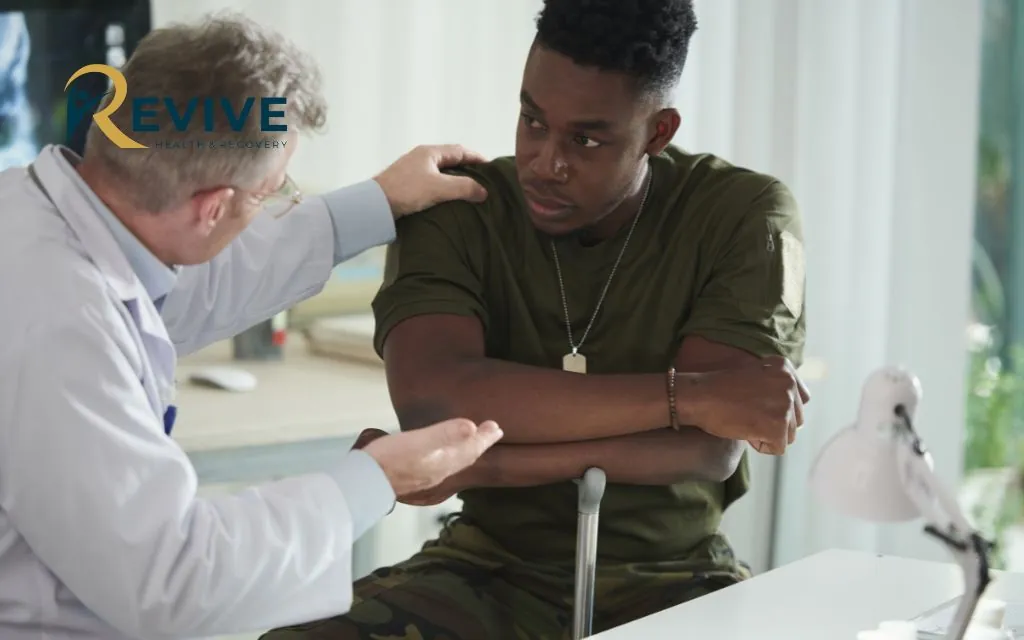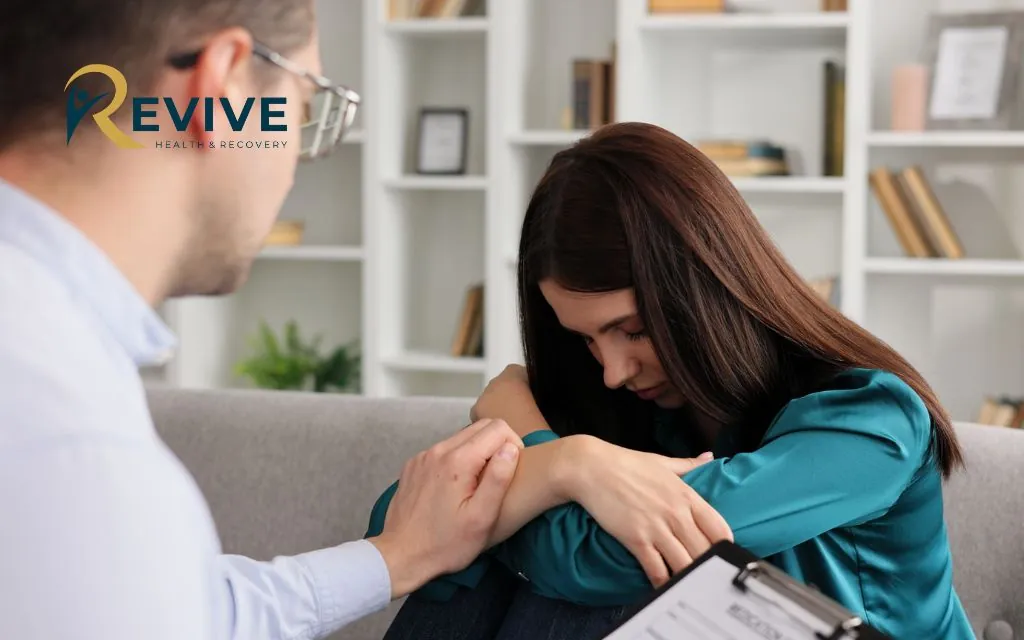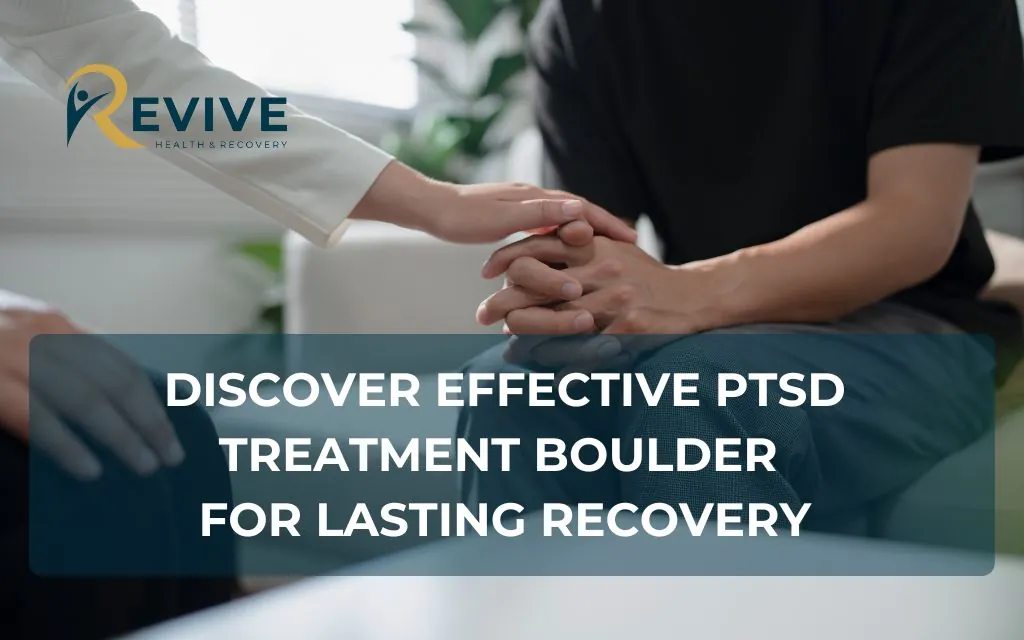Living with post-traumatic stress disorder can feel like carrying an invisible weight that affects every aspect of your life. If you’re searching for PTSD treatment in Boulder, you’ve taken a courageous first step toward healing. Boulder stands out as a leading center for innovative, personalized mental health treatments that combine evidence-based approaches with holistic care.
In this guide, we’ll walk you through understanding PTSD, explore effective treatment options available in Boulder, help you find the right care provider, and outline practical steps to begin your recovery journey. At Revive Health Recovery, we understand the challenges you face and are here to support you every step of the way.
Understanding PTSD
What is PTSD?
Post-traumatic stress disorder (PTSD) is a mental health condition triggered by experiencing or witnessing traumatic events, and understanding its complexities can help guide effective recovery. These events might include combat exposure, physical or sexual assault, serious accidents, natural disasters, or childhood abuse. The brain’s response to severe trauma can create lasting changes that manifest as intrusive memories, nightmares, severe anxiety, and uncontrollable thoughts about the traumatic event.
According to research from the National Institute of Mental Health, approximately 7-8% of the U.S. population will experience PTSD at some point in their lives, with women being twice as likely as men to develop the condition. PTSD affects more than just mental health—it can strain relationships, impact work performance, and significantly reduce quality of life.
Unlike normal stress responses that diminish over time, PTSD symptoms persist and can intensify, significantly interfering with daily functioning. Many people experiencing PTSD describe feeling constantly on edge, emotionally numb, or disconnected from loved ones.
Who is at Risk?
While PTSD can affect anyone who experiences trauma, certain groups face higher risk:
- Veterans and active military personnel exposed to combat
- Survivors of sexual assault or domestic violence
- First responders regularly exposed to traumatic situations, who can benefit from specialized trauma recovery programs tailored to their unique needs.
- Survivors of serious accidents, natural disasters, or terrorist incidents
- Children who experience or witness physical, emotional, or sexual abuse
Studies show that approximately 7-8% of the U.S. population will experience PTSD at some point in their lives, with women being twice as likely as men to develop the condition.

The Impact of PTSD
PTSD affects far more than just mental health. It can strain relationships with family and friends, impact work performance, and significantly reduce quality of life. Many individuals with PTSD also struggle with co-occurring conditions such as depression, substance use disorders, and chronic pain, creating complex treatment needs.
The hypervigilance and sleep disturbances common in PTSD can lead to physical health problems, including cardiovascular issues and compromised immune function. Each person’s experience with PTSD is unique, influenced by factors such as personal resilience, support systems, and previous trauma history.
Effective PTSD Treatment Options in Boulder
Evidence-Based Therapies
Boulder offers access to several scientifically validated treatments for PTSD. The American Psychological Association’s clinical practice guidelines recommend several evidence-based approaches for treating PTSD, many of which are readily available in Boulder’s specialized treatment centers:
Cognitive Behavioral Therapy (CBT) helps identify and change negative thought patterns related to trauma. CBT provides practical strategies to manage symptoms and develop healthier coping mechanisms.
Eye Movement Desensitization and Reprocessing (EMDR) is particularly effective for PTSD. This therapy uses bilateral stimulation (typically eye movements) while processing traumatic memories to help the brain reprocess these experiences. Many Boulder clinics, including specialists at Revive Health Recovery, offer EMDR for PTSD Boulder patients with impressive success rates.
Prolonged Exposure Therapy gradually and safely helps individuals confront trauma-related memories, feelings, and situations they’ve been avoiding. This exposure helps reduce the power these memories hold over daily life.
Centers like Delos Psychiatry and Revive Health Recovery provide these specialized treatments with therapists who understand trauma’s complex nature.
Medication and Integrated Care
For many individuals, medication can be an important component of PTSD treatment. Antidepressants, particularly SSRIs like sertraline (Zoloft) and paroxetine (Paxil), are FDA-approved for PTSD treatment. Anti-anxiety medications may be prescribed for short-term use to manage severe symptoms.
Boulder excels in integrated care approaches, where psychiatrists and therapists work together to coordinate medication management with psychotherapy. This collaborative approach ensures all aspects of treatment work in harmony to address both symptoms and underlying causes.
Holistic and Alternative Therapies
Boulder’s health-conscious culture makes it an ideal location for holistic PTSD therapy Boulder residents can access. These complementary approaches often work alongside traditional treatments:
Mindfulness and Meditation practices help individuals stay grounded in the present moment rather than being triggered by past trauma or future worries.
Yoga for Trauma Recovery combines movement, breathing, and mindfulness specifically designed for trauma survivors, helping reconnect with the body in a safe way.
Art and Music Therapy provide non-verbal paths to process traumatic experiences when words feel insufficient.
Outdoor and Adventure Therapy leverages Boulder’s natural environment to facilitate healing through connection with nature and building self-confidence through guided challenges.
Innovative Approaches
Boulder stands at the forefront of cutting-edge PTSD treatment research and application:
MDMA-Assisted Therapy shows remarkable promise for PTSD treatment. Organizations like MAPS (Multidisciplinary Association for Psychedelic Studies) have conducted groundbreaking research in Boulder, with phase 3 clinical trials showing significant symptom reduction for participants who hadn’t responded to traditional treatments.
A landmark study published in Nature Medicine concluded that “MDMA-assisted therapy is highly efficacious in individuals with severe PTSD, and treatment is safe and well-tolerated, even in those with comorbidities.” This research represents a major breakthrough in treatment options for those who haven’t responded to conventional approaches. MAPS has submitted a New Drug Application to the FDA for MDMA-assisted psychotherapy for PTSD treatment, which could potentially become the first psychedelic-assisted therapy to obtain government approval in the US.
Neurofeedback helps individuals gain control over brain wave patterns associated with trauma responses, effectively training the brain toward healthier functioning.
These innovative approaches reflect Boulder’s commitment to advancing mental health treatment beyond conventional methods.

Finding the Right PTSD Treatment in Boulder
Top PTSD Treatment Centers
Boulder offers several outstanding centers specializing in trauma treatment:
Revive Health Recovery provides comprehensive trauma-informed care with both traditional and holistic approaches, and their Denver-based programs offer additional PTSD treatment options for those in the region. Their team specializes in integrated treatment for PTSD and co-occurring conditions, with particular expertise in complex trauma. Their personalized recovery plans address each client’s unique needs and circumstances.
Flatirons Recovery offers trauma-specific programming within their broader mental health services, with a focus on sustainable, long-term recovery.
Delos Psychiatry combines medication management with psychotherapy for integrated PTSD care, particularly for cases involving complex symptoms.
Each center offers distinct approaches, making it possible to find PTSD treatment that aligns with your personal needs and preferences.
Specialized Therapists
Boulder boasts numerous highly qualified therapists specializing in trauma treatment:
Dr. Arielle Schwartz is a renowned EMDR specialist in Boulder with extensive experience treating complex trauma.
The Boulder Therapy Group includes several therapists with specialized training in trauma-focused CBT and other evidence-based approaches.
To find PTSD counselor in Boulder with specific expertise, resources like Psychology Today’s therapist directory allow filtering by specialty and treatment approach, while Denver also offers access to highly qualified PTSD therapists for those nearby..
Veteran-Specific Care
Veterans facing PTSD have access to specialized resources in Boulder:
The VA Eastern Colorado Health Care System provides evidence-based PTSD treatments specifically tailored to military experiences.
The VA National Center for PTSD offers comprehensive educational resources and treatment guidelines specifically designed for veterans, active service members, and their families coping with military-related trauma.
The Boulder Crest Foundation offers innovative programs based on post-traumatic growth models specifically designed for veterans.
These programs provide culturally competent care that acknowledges the unique aspects of military trauma and the challenges of transition to civilian life.
Affordable and Accessible Options
Quality PTSD treatment shouldn’t be limited by financial resources. Boulder offers several paths to affordable PTSD therapy in Boulder:
Many therapists and centers offer sliding scale fees based on income.
Community mental health centers like Mental Health Partners provide services regardless of ability to pay.
NAMI Boulder offers free support groups and resources for individuals and families affected by PTSD and other mental health conditions.
The University of Colorado’s Raimy Psychology Clinic offers lower-cost therapy provided by supervised graduate students in clinical psychology.
Telehealth Services
Telehealth PTSD treatment Boulder providers offer brings quality care directly to your home:
Virtual Therapy Sessions allow you to connect with specialists without travel, particularly beneficial for those with mobility issues or transportation challenges.
Extended Reach means you can access the best PTSD treatment centers in Boulder Colorado even if you live in surrounding communities.
Flexible Scheduling makes it easier to fit treatment into busy lives, increasing consistency and treatment effectiveness.
Many Boulder therapists now offer hybrid models, combining in-person and telehealth sessions to maximize convenience while maintaining personal connection.

How to Choose the Right PTSD Therapist or Center
What to Look For
Finding the right provider is crucial for successful PTSD treatment:
Credentials and Specialization: Look for licensed mental health professionals (psychologists, LPCs, LCSWs) with specific training in trauma treatment.
Treatment Approaches: Consider which evidence-based methods (CBT, EMDR, exposure therapy) align with your preferences.
Experience with Your Specific Trauma Type: Some therapists specialize in particular traumas (combat, sexual assault, childhood abuse).
Personal Compatibility: The therapeutic relationship is crucial for trauma work; trust your instincts about whether you feel comfortable with a provider.
Questions to Ask
When researching providers, consider asking:
“What specific training do you have in trauma treatment?”
“Do you offer EMDR or other specialized trauma therapies?”
“What’s your experience working with [your specific type of trauma]?”
“How do you measure progress in PTSD treatment?”
“What’s your approach to handling flashbacks or dissociation during sessions?”
“How do you incorporate family members or support people in treatment?”
These questions help determine if a provider has the expertise and approach that matches your needs.
Booking Your First Appointment
Taking that first step can feel overwhelming. Here’s how to proceed:
- Research providers through online directories, referrals, or insurance networks
- Call to verify they’re accepting new clients and check insurance coverage
- Schedule an initial consultation, which may be shorter than regular sessions
- Prepare by noting your symptoms, concerns, and goals for treatment
- Bring information about previous treatments and current medications
- Remember you’re evaluating the therapist as much as they’re assessing your needs
Many people meet with several therapists before finding the right match, which is completely normal and encouraged.
Understanding Costs and Insurance for PTSD Treatment
Cost Range for Therapy
In Boulder, therapy session costs typically range:
- Individual therapy: $120-$200 per session
- Specialized trauma treatments (EMDR): $150-$225 per session
- Group therapy: $40-$80 per session
- Intensive outpatient programs: $3,000-$10,000 depending on duration and services
Initial assessments often cost more than regular sessions due to their comprehensive nature.
You can also check out inpatient trauma treatment in Denver which offers more intensive care at varying cost structures.
Insurance Coverage
Most health insurance plans cover mental health treatment, including PTSD therapy:
- Check your plan’s summary of benefits for “behavioral health” or “mental health” coverage
- Verify in-network providers to minimize out-of-pocket costs
- Understand deductibles, copays, and session limits that may apply
- Ask about pre-authorization requirements for specialized treatments
If using insurance, ask potential providers if they accept your plan or can provide “superbills” for out-of-network reimbursement.
Financial Assistance
Beyond insurance, several options can make treatment more affordable:
- Veterans can access free PTSD treatment through VA benefits
- Colorado’s Office of Behavioral Health offers resources for those without adequate insurance
- Health Service Corps clinicians provide reduced-cost services based on income
- Some therapists reserve slots for pro bono or reduced-fee clients
- Hospital-based programs often have financial assistance programs
Don’t let financial concerns prevent you from seeking help. Most providers can suggest options based on your specific situation.
Why Boulder Stands Out for PTSD Treatment
Boulder has emerged as a premier destination for PTSD treatment due to several unique factors:
The city boasts an exceptionally high concentration of mental health professionals, many with specialized trauma training and certification in cutting-edge treatments.
Boulder’s progressive approach to mental health embraces both evidence-based clinical interventions and complementary holistic practices, creating truly integrated care options.
The presence of research institutions like the University of Colorado and organizations such as MAPS have established Boulder as a hub for pioneering trauma treatment research, including studies on psychedelic-assisted therapies for PTSD.
The supportive community culture reduces stigma around mental health treatment, creating an environment where seeking help is normalized and encouraged.
Boulder’s natural setting offers therapeutic benefits beyond the clinical setting, with opportunities to incorporate outdoor and nature-based healing approaches.
FAQs about PTSD Treatment Boulder
What are the best PTSD treatments in Boulder?
The most effective PTSD treatments in Boulder include EMDR, Cognitive Processing Therapy, and Prolonged Exposure Therapy. Revive Health Recovery offers these evidence-based treatments with specialists who understand trauma’s complex nature. The “best” treatment varies by individual needs, but Boulder’s diverse offerings ensure you can find an approach that works for you.
How much does PTSD therapy cost in Boulder?
PTSD therapy in Boulder typically costs between $120-$200 per session, with specialized treatments like EMDR sometimes costing $150-$225. Many providers, including Revive Health Recovery, offer sliding scale options and work with insurance to make treatment affordable. Never let cost concerns prevent you from reaching out—most centers will help identify financial solutions.
Are there telehealth options for PTSD treatment in Boulder?
Yes, many Boulder providers including Revive Health Recovery offer telehealth PTSD treatment. These virtual sessions provide the same quality care as in-person therapy, but with added convenience and accessibility. Telehealth is especially beneficial for those with transportation challenges, busy schedules, or who feel more comfortable starting therapy from home.
How do I book a PTSD therapy appointment in Boulder?
To book PTSD therapy appointment Boulder providers offer, start by researching therapists specializing in trauma treatment, then call their office directly to schedule an initial consultation. At Revive Health Recovery, you can easily book an appointment by calling (303) 268-4655 or visiting our website. Most centers offer prompt assessments to get you started on your healing journey quickly.
How long does PTSD treatment typically take?
PTSD treatment duration varies based on trauma complexity, symptoms severity, and individual response to therapy. Evidence-based treatments like CPT or PE typically involve 12-16 weekly sessions, while EMDR may require 8-12 sessions for single-incident trauma or longer for complex trauma. At Revive Health Recovery, we create personalized treatment plans focused on effective healing rather than arbitrary timelines.
Taking the First Step Toward Healing
Recovery from PTSD is possible, and many people find that treatment not only reduces symptoms but leads to profound personal growth and renewed meaning in life. Boulder’s exceptional mental health resources provide multiple pathways to healing, whether through traditional therapy, innovative treatments, or holistic approaches.
The journey begins with a single step—reaching out for help. At Revive Health Recovery, we understand that making that first call can be intimidating, but our compassionate team is ready to guide you through every stage of the process.
Don’t wait to start your healing journey. Contact Revive Health Recovery today at (303) 268-4655 to speak with our trauma specialists and discover how we can support your path to recovery. Our team is available 24/7 to answer your questions and help you book your initial consultation.
You’ve already shown courage by seeking information. Now let us help you take the next step toward healing.



